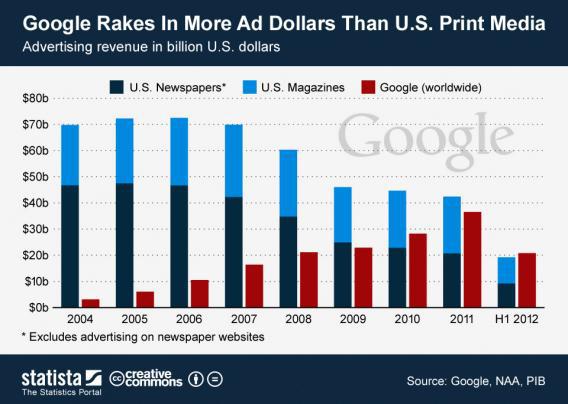Five years ago, I sat in an auditorium at Stanford University and listened to Marissa Mayer explain how much Google cared about the financial fortunes of the newspaper industry. Here’s an excerpt from the Stanford News Service report about the panel discussion, in which Mayer, then Google’s director of search and user experience, joined old-media bigwigs like the New York Times’ Bill Keller to ruminate on the future of journalism:
Mayer, as the lone panelist from a purely web-based company, spoke of depending on trusted content providers like those seated beside her and of having a stake in seeing their news organizations prosper financially so reporters and editors can continue to be paid to produce quality stories. … “For us, it’s really about partnering with content providers and ultimately finding distribution and monetization channels for them.”
The newspaper industry was willing to play along, if only for lack of a better idea. Gary Pruitt, then the CEO of McClatchy Newspapers and now CEO of the Associated Press, said, “We take comfort from Charles Darwin’s observation that it’s not the strongest species that survives, nor the most intelligent, but the ones most responsive to change. We just need to be adaptable.”
Flash forward half a decade, and it turns out that newspapers weren’t the strongest, the most intelligent, or the most adaptable. They’ve continued to churn out the same content while watching their advertisers steadily flee for sites like Craigslist, Yahoo, the Huffington Post/AOL, Facebook, and yes, Google. Some European papers today are belatedly trying to band together to prevent Google from displaying their headlines without paying royalties.* There’s no guarantee that such a scheme would have worked even in 2007, given the Internet ethos that information wants to be free. But it might have had a better chance then than today.
The chart above, from Statista’s Felix Richter, plots Google’s digital advertising revenue against the print advertising revenue of all U.S. newspapers and magazines. If Google and content providers are indeed “partners,” it’s pretty clear that one partner is getting a lot more out of the deal than the other. And as for that stake Google had in helping newspapers monetize online? Well, The Guardian’s Roy Greenslade estimates that Google’s total revenue also now exceeds that of the entire U.S. newspaper industry even when you count digital ads.
If Google did have a stake in the newspaper industry’s success, now might be a good time to go ahead and pull it out. The blood’s probably already dry.
*Correction, Nov. 13: This post originally stated that European papers are trying to prevent Google News from aggregating their headlines. In fact, they want compensation for headlines and links that appear in non-news search results, as well.
